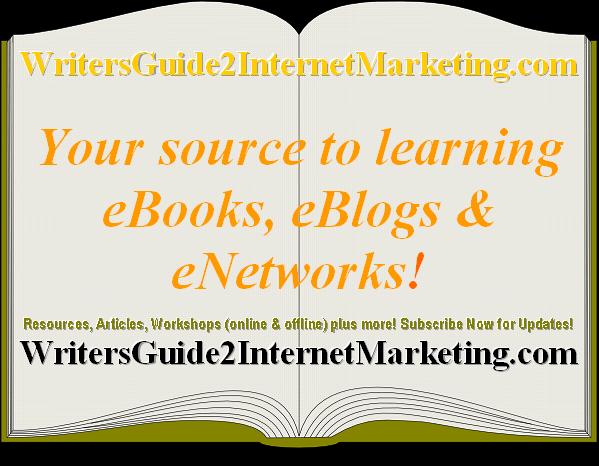LCLICK THRU FOR DETAILS
|
About
REQUEST THIS BLOGGER
Book Update
A guide for writers with or without published work. A comprehensive resource that every writer should have in their library in order to learn how to publish, promote, and market themselves on the Internet.
Is your book project ready for the next E-Revolution?
Wednesday, December 28, 2011
Online & Social Networking: Encourage Your Blog Visitors to Digg Your Content
Do You Avoid LinkedIn Because You Don't Know How to Use It? via @coachjudy
I'm discouraged by what I see on LinkedIn. Many authors don't take advantage of LinkedIn's power to promote and market themselves and their books there. It's frustrating for me to see the big mistakes authors are making on what has become the second largest social network in the U.S, and the one that is perfect for authors and businesses that brand themselves with a book. LinkedIn is the best way to get you and your book seen and loved! You get much more visibility and credibility on LinkedIn than FB and Twitter. What Are Book Authors and Professionals Doing Wrong on LinkedIn? Find out at: blog.bookmarket.com/2011/12/book-marketing-makeover-do-you-avoid.html =============== 25 year Book Coach, Judy Cullins helps you in business to write a "best seller" and build your brand with a short book to sell all the books and get all the clients you need. Author of... "Write your eBook Other Short Book-Fast!" "LinkedIn Marketing: 8 Best Tactics to Build Book and Business Sales" "Advanced Article Marketing" Click http://www.bookcoaching.com/help-writing-a-book.php to get fresh, free, weekly publications on book writing, self publishing, and online marketing Network with Judy on... http://www.linkedin.com/in/judycullins http://twitter.com/CoachJudy http://www.facebook.com/coachjudycullins =============== judycullins@cox.net 619/466-0622 |
Wednesday, December 14, 2011
[Build Book Buzz] 6 Things to Include in Your HARO Responses via @sandrabeckwith
click thru for more details
Beckwith Communications 25 Erie Crescent Fairport, NY 14450 US |
Monday, December 12, 2011
Ten Ways to Give Writing Feedback to Boost Your Success via @coachjudy
Writing a book? Website? Promotional Materials? Want to up level your already quality writing? Whatever we write, we need to share it with our peers or professionals for feedback before we present it to our paying audience. Getting writing feedback offers many benefits. Even though you know your topic well, you may have some old writing sins lurking in your copy. While a bit scary, if you can put your ego aside, you'll get valuable ideas from others to make your writing more clear and inspiring. You will learn how to identify your writing strengths and weaknesses, and you will develop your own writing style and voice. "Congrats on your bookcoaching.com site and your 180 blog posts. They are full of great information for professionals like me, and I really appreciate reading them! I'm working on so many projects at the same time my priority is to build my opt-in list, and create rapport, so my next step will be to use the connections I have on LI to send them my free report ( when it will be ready) and ask them their opinion and feedback. It is a sincere pleasure reading your comments!" -Patricia Gozlan, Prosperity Coach Expert You can exchange feedback with your peers via email or you can join a writing or book group such as the one I offer at LinkedIn, or get individual or group coaching. Remember, your writing must be easy to understand or it won't get read or sell. 10 Parts to Give Feedback On 1. Does the opening grab your attention? How? Is it clear? Is it engaging? 2. What syntax needs editing? (grammar) Are tenses consistent? 3. Does it use action verbs rather than linking (to be) verbs? Do the verbs advance the story and tighten the writing? 4. Does your piece show, not tell? Do you use senses of sight, sound, emotions, and touch? Does it engage rather than tell? Do you use creative non-fiction techniques such as dialogue? 5. Do you have redundancies that slow your writing down? 6. Does your writing use adjectives and adverbs too much? 7. Is it factually accurate? 8. Is it coherent? Does it flow and sound natural? Is it easy to understand? 9. Are the dialogues believable? Does it have enough dialogue? (think creative non-fiction). 10. Does the ending sum up or compel your reader to want to keep reading or take action? 3 Rules of Giving the Oreo Cookie Method Feedback Over 25 years as a book coach, I've used this Oreo Cookie Method. You'll develop bravery and confidence if you use this wisely with a trusted writing coach or peers. And, you'll get great writing results that help you sell later. 1. First, give one general statement of the copy's strength and what grabbed you. Include one positive before you launch into correction mode. In any writing feedback group, you want to encourage new writers and make it safe to expose their mistakes. 2. Second, give more specific feedback in parentheses next to the sentence error. Or, give specific feedback on what to leave out and what to keep as "gold." Or, anything else that will make the writing better. We all want this one to keep our writing readable. Only readable copy helps you get readers and sales later on. 3. Last, Conclude with a positive and encouragement. If you want to strengthen your writing before your audience sees it, take some time to get some writing feedback. Pros and emerging writers need it. Do this before you get your final line edit. Now, make me smile and give me a comment! Want ongoing free help? Commit to Judy's LinkedIn book group at www.linkedin.com/groups/Book-Writing-Self-Publishing-Marketing-1812052 Serious and committed to move forward much faster to get your cash flow going? See Judy's coaching pages at bookcoaching.com/publishing-your-own-book.php Remember, any journey is easier and faster with a partner. Choose the path that suits you. =============== 25 year Book Coach, Judy Cullins helps you in business to write a "best seller" and build your brand with a short book to sell all the books and get all the clients you need. Author of... "Write your eBook Other Short Book-Fast!" "LinkedIn Marketing: 8 Best Tactics to Build Book and Business Sales" "Advanced Article Marketing" Click http://www.bookcoaching.com/help-writing-a-book.php to get fresh, free, weekly publications on book writing, self publishing, and online marketing Network with Judy on... http://www.linkedin.com/in/judycullins http://twitter.com/CoachJudy http://www.facebook.com/coachjudycullins =============== judycullins@cox.net 619/466-0622 |
Tuesday, December 6, 2011
Court Sanctions Party And Counsel Over Deleted Facebook Content
click thru for details
| |||||||||
Friday, December 2, 2011
Computers, Mobile Devices & Gadgets: Using the Kindle App for iPhone and iPod Touch
click thru for details
|
Tuesday, November 29, 2011
[New Post] How to Monetize Your Blog without Selling Your Soul via @michaelhyatt
click thru for details
|
IS YOUR LITERARY PROJECT READY FOR THE EBOOK REVOLUTION?
COMING SOON:


